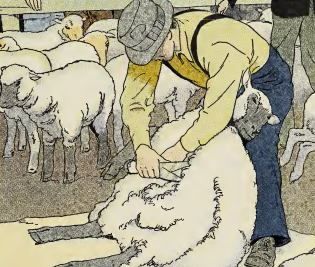SHEEP-SHEARING ON NANTUCKET ISLAND
在南塔克特岛剪羊毛
Alice Cushing Gardiner and Nancy Cabot Osborne
爱丽丝·库欣·加德纳和南希·卡伯特·奥斯本
The three greatest needs of everyone are food, shelter, and clothing.
每个人最需要这三样东西:食物、住所和衣服。
For hundreds of years workers have grown crops for food, built houses to live in, and made cloth from wool and plants.
几百年来,工人们种植粮食作物,建造住房,用羊毛和植物织布。
Raising sheep for their wool is still an important work, just as it was on Nantucket Island when Mary and Peter were children.
想要收羊毛,养羊是一项重要的工作,就像玛丽和彼得小时候在南塔克特岛那样。
GETTING READY FOR SHEARING DAY
剪羊毛日
The sheep on Nantucket Island were not kept in pastures,
南塔克特岛的羊不在牧场饲养,
but on large open lands where they grazed in thousands.
而在开阔的土地上饲养,成千上万只羊在那里食草。

There were no shepherds to take care of them, for of course they could not run away;
没有专门的牧羊人来照顾它们,因为这些羊没法逃走;
so the sheep roamed about eating what they could find, and became very ragged and dirty.
于是羊就四处游荡,吃着它们能找到的东西,变得脏兮兮的。
They got along fairly well, for there were neither wild animals nor cruel dogs to harm them.
这些羊生活得很好,因为既没有野兽也没有残暴的狗来伤害它们。
Every year, on the second Monday in June, all the sheep were sheared.
每年六月的第二个星期一,所有羊毛都会被剪掉。
During the week before shearing day the sheep were driven into the great pens beside a large pond, and on Saturday they were washed.
剪羊毛日的前一周,羊群被赶进大池塘边的大栅栏里,星期六对它们进行清洗。
On the following Monday, everyone on the Island had a holiday and went out to see the shearing and have some fun.
下个星期一,岛上的每个人都放假了,去看剪羊毛和玩乐。
They took their lunches with them, or bought them at booths and tents that were set up for the shearing.
他们带着午餐,或是在棚子里,或是在为剪羊毛而搭的帐棚里买午餐。
Peter's Uncle Samuel owned many sheep.
彼得的叔叔塞缪尔养了许多只羊。
He always provided lunch for his shearers and his family in his own tent.
他总是在自己的帐篷里为剪羊毛工人和家人提供午餐。












